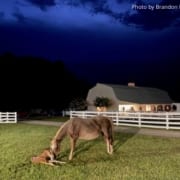Horse Owners – EEE Vaccine Reminder Spring 2021
Area horse and donkey owners, take note: It’s time to start thinking about making sure your equines are vaccinated against a couple of mosquito-borne illnesses that often prove fatal to the animals that contract them.
N.C. Agriculture Commissioner Steve Troxler said Eastern Equine Encephalomyelitis (EEE) and West Nile Virus are two illnesses that can be prevented with a simple vaccination.
“Mosquito-breeding season in North Carolina lasts from spring until the first frost and horses are at risk if not properly vaccinated,” Troxler stated in a press release. “EEE is fatal 90 percent of the time in horses and WNV has a fatality rate of 30 percent.”
North Carolina reported nine recorded cases of EEE in 2020, a relatively high number, according to Troxler. “Horse owners need to act now to vaccinate their animals,” Troxler said.
State Veterinarian Dr. Doug Meckes recommends that equine owners talk to their veterinarians about an effective vaccination protocol to protect horses from mosquito-borne diseases. The combination vaccination initially requires multiple injections for horses, mules and donkeys that have no prior vaccination history.
Mosquitoes can breed in any puddle that lasts for more than four days, so removing any source of standing water can reduce the chance of exposing animals to WNV or EEE. Keeping horses in stalls at night, using insect screens and fans, and turning off lights after dusk can also help reduce exposure to mosquitoes. Insect repellants can be effective if used according to the manufacturer’s instructions.
· Symptoms of EEE include impaired vision, aimless wandering, head pressing, circling, inability to swallow, irregular staggering gait, paralysis, convulsions and death. Once a horse has been bitten by an infected mosquito, it may take three to 10 days for symptoms to appear.
· Symptoms of WNV include fever, weakness or paralysis of hind limbs, impaired vision, head pressing, seizures and aimless wandering.
“If your horses or other equine animals exhibit any symptoms of EEE or WNV, contact your veterinarian immediately,” Meckes said.
People, horses and birds can become infected from a bite by a mosquito carrying the diseases, but there is no evidence that horses can transmit the viruses to other horses, birds or people through direct contact.
“It’s also a great time to make sure your animal is current on its rabies vaccination,” Troxler said. “In North Carolina, we see about five cases of rabies in livestock each year. Horses are naturally curious animals, which puts them at risk for a bite if a rabid animal gets through their fence line.”


